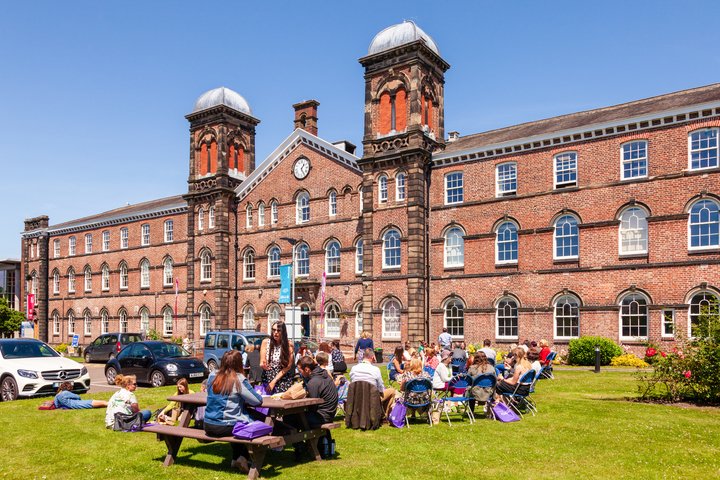
Psychology is the scientific study of the human mind and how it influences our behaviour. As a subject discipline, we explore what influences behaviour from topics such as:
- Memory, attention, and perception
- Understanding the experiences and treatment of mental health
- Child development and learning
- Asking why people can be violent and aggressive
- Understanding health and health promotion
- Motivation in athletes
- The impact of job stress
- Connectedness to nature and how this can be used therapeutically
Our understanding of psychology and psychological concepts comes from a now significant body of research that has helped to understand and explain different aspects of behaviour, to predict future instances of behaviour, and also to change and impact it where appropriate. For example, research has helped us understand why people experience anxiety and depression, what factors increase the likelihood of experiencing these, and ultimately how we can work therapeutically to treat those who are diagnosed and improve their quality of life.
What’s the difference between Psychology and Applied Psychology?
Psychology as a subject discipline is based on research and theory that helps us understand human behaviour. Psychology in its traditional form focuses on exploring the theoretical underpinnings and using traditional empirical methods (e.g. experimentation and observation) to advance our understanding and knowledge. At the University of Cumbria, students studying Psychology will engage in modules such as “Advanced Research Design”, “Understanding Memory Disorders” or “Social Cognition”.
Applied psychology is more focused on using the theory and knowledge that we have about psychology and applying it in real-world settings. Those working in this area will apply their psychological knowledge to educational settings (e.g. schools), forensic settings (e.g. prison or probation), and therapeutic settings (e.g. counselling). Students studying Applied Psychology may engage in modules such as “The Psychology of Teaching and Learning”, “Offender Management and Rehabilitation”, “Trauma and Resilience” and “Occupational Psychology”.

What careers can psychology lead to?
Obtaining an accredited undergraduate psychology degree from the British Psychological Society (BPS) gives you a wide range of skills, opening up opportunities within a variety of job sectors. The degree can provide a solid foundation for a range of careers. A number of psychology graduates become professional psychologists such as Forensic Psychologists, Counselling Psychologists and Educational Psychologists. To pursue a professional psychology career, you must obtain an accredited undergraduate degree.
However, psychology graduates often pursue other career paths. You can apply to undertake postgraduate level qualifications in Social Work, Occupational Therapy, Youth Work, Teaching, Mental Health Nursing, Counselling, Speech Therapy, Careers Guidance, Personnel Management, Marketing and Sales, Drug and Alcohol advisor and a wide range of other roles.
To find out more about professional psychology careers, visit the BPS website:
BPS Related roles and careers page

Why study Psychology at Cumbria?
We asked our first and second-year students why they chose Cumbria and what they would say to others looking for somewhere to study this subject.
Here are their top 20 reasons to come and study with us:
1. Small classes nice to know everyone on the course
2. Personal touch – a great partnership between lecturers and students
3. Collaborative/supportive learning experience
4. Approachable lecturers can ask them anything
5. Great extracurricular activities
6. Experienced staff with interesting stories
7. Fun interactive lectures
8. Group discussions in lectures for more effective learning
9. Deliver the opportunities advertised on web pages for the community
10. Experienced researchers who include us in their work
11. Publication and conference opportunities for us
12. Comfortable learning environment
13. Lecturers really know their stuff and are invited to participate in conferences and training events nationally and internationally.
14. Lecturers genuinely care about our success and are always there to provide help.
15. The support from lecturers and other students is amazing.
16. Huge range of approaches to learning, from lectures, workshops, seminars, practical activities, role plays, intervention planning, debates and case conferences.
17. The passion and engagement of the lecturers and the engagement with realistic topics and intervention planning are superb.
18. Staff experience, knowledge and their down to earth inclusive style are brilliant
19. Smaller classes allow for more 1 to 1 support
20. Whenever the staff get involved in anything interesting, they try to find ways for us to be part of it.

If you would like to find out more about our BPS accredited courses at the University of Cumbria, click on one of the links below.
Follow us on Twitter: @UoC_Psychology
Like us on Facebook; University of Cumbria – Psychology
Instagram: uocpsychology
Want to find out more?
You are ready to take that next step. Ready to make that life-changing decision and work towards your career goals. By downloading our prospectus you will have the world at your fingertips.
You can browse our 100+ unique course options and have access to finance and support information to get you started. Discover all of the courses available to you from Arts to Zoology – we’re excited to see what you choose.

.jpg)


.jpg)